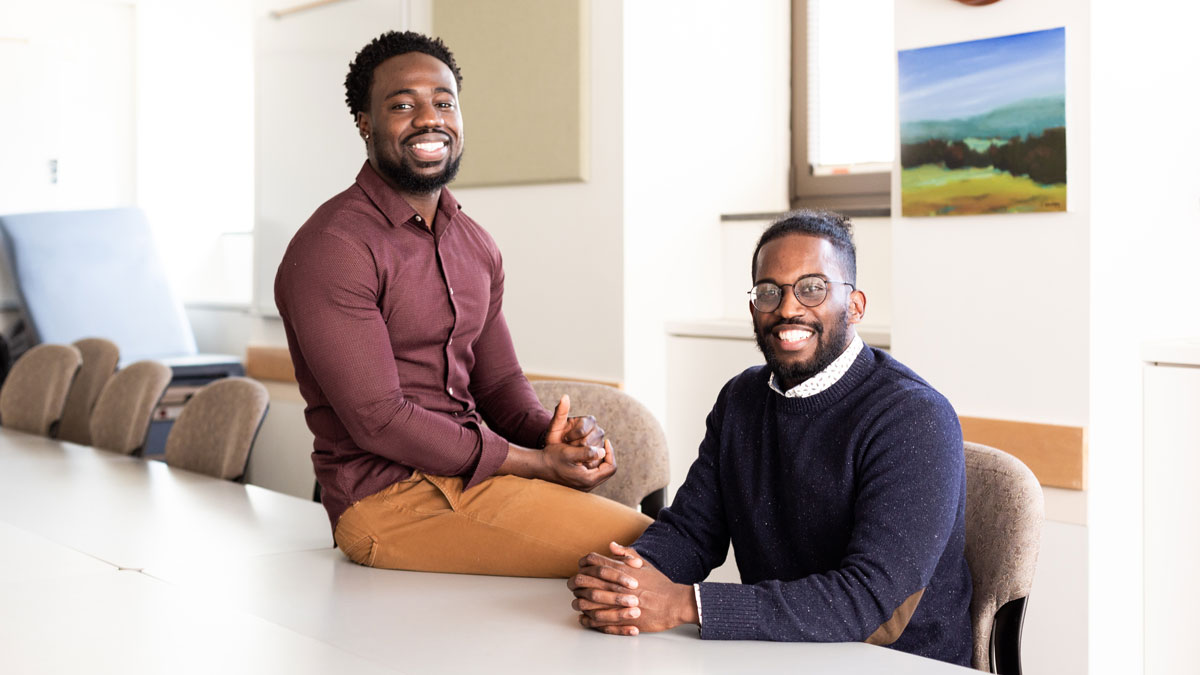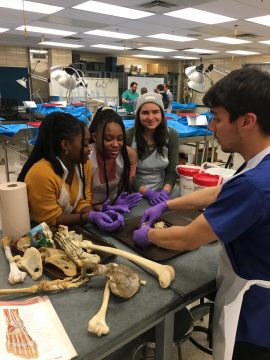
It’s a sunny winter’s morning on the campus of Dartmouth’s Geisel School of Medicine, and two groups of students from nearby Lebanon and Hartford High Schools fill a classroom in Geisel’s Remsen Hall.
Accompanied by Ryan Gambero, a science teacher from Hartford H.S., and Will Connell, an English and social studies teacher from Lebanon H.S., each group is there to take advantage of an experiential learning opportunity called Upper Valley STEM (Science, Technology, Engineering, and Mathematics) Scholars.
The collaborative project is led by Geisel students and Schweitzer Fellows Shuaibu Ali ’21 and Kenny Williams ’21, in partnership with the teachers and their Geisel classmates Laura Herrera Gomez ’21 and Carlos Aramayo ’21.
“One of our main goals is to engage you, through some different STEM activities and through mentorship, so that you’ll see some of the career options that are available to you in STEM fields like medicine,” Ali tells the students.
A recent community needs assessment has shown that in the Upper Valley—with employers like Dartmouth College, Dartmouth-Hitchcock, Hypertherm, and the Cold Regions Research and Engineering Laboratory in close proximity—demand for workers in STEM-related fields is on the rise.
On this day, the groups are visiting Geisel’s anatomy lab to learn first-hand about different aspects of human anatomy and disease processes by viewing the bodies of program donors. The high school students start with an “ice-breaker” exercise before hearing about another important goal of the project.

“We also plan to have some discussions about equity and societal issues, like social determinants of health,” says Williams. “By working to bridge the gap between different worlds and different perspectives, we hope that we can all learn some new skills that will help us empower ourselves and each other.”
A series of racially charged events have recently occurred at Lebanon High School, which has prompted students, teachers, and school administrators to ask for help from the community. People of color from across the Dartmouth campuses have responded—by making regular visits to the school to offer their support to those who feel victimized, and by expanding the scope of projects like Upper Valley STEM Scholars.
During their visit to the anatomy lab—guided by the medical students and James Reed, who runs the lab and directs Geisel’s anatomic gifts program—the students are fully engaged, interacting easily with one another and asking questions as they rotate through four different anatomical stations.
At the conclusion of the visit, Gambero says, “Giving the kids this kind of exposure, which shows them, ‘If you’re interested in this field, here are some of the things you can do,’ has been great for them. It’s not the type of learning experience they can get in the normal classroom settings.”
Connell adds, “The word that really comes to mind for me is ‘access,’” he says. “Being invited in by the medical students and seeing what their days are like, and then more broadly, getting our students of color connected with a future where they can see themselves in a STEM-related career has been really powerful.”
Later, the medical students—who share similar backgrounds as people of color and those who were raised in lower income households—offer some thoughts about their project.
“I think mentoring is one of the most important things we can do,” says Gomez, who along with Aramayo serves as co-president of the Dartmouth Chapter of the Latino Medical Students Association. “When I was younger, having someone who believed in me was really important, so I’ve always wanted to be there for other kids.”
“By exposing the students to different facets of medicine, listening to them and sharing some of our own experiences, we hope that they’ll feel validated and more empowered about their future, whether that ends up being in medicine or another field,” says Aramayo.
This spring, the four are offering workshops at both Geisel and Dartmouth-Hitchcock Medical Center that show the students examples of human physiology and disease, clinical interventions and treatments, and how societal issues, such as poverty and racial status, impact the health of communities.
“It’s been very rewarding to see the kids get so engaged with the project—I know somebody sparked my interest in STEM, so even the possibility of being that flint that starts the fire in someone else is humbling,” says Williams. “And to see students really starting to think critically about how they can bring positive change to their school and to their community is impressive.”
Ali agrees. “I’ve enjoyed getting to work with two schools that have such great stakeholders, in Will and Ryan,” he says. “Seeing how passionate they are about empowering their students and giving them outside-the-classroom experiences that will likely help shape their career choices and their impact on society someday—is not only refreshing to see, it’s inspiring.”